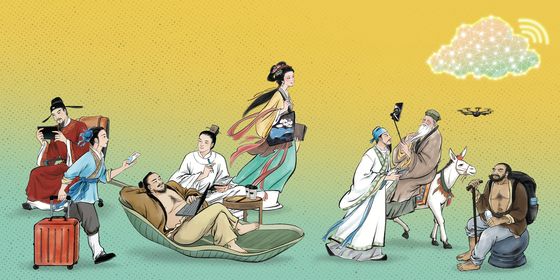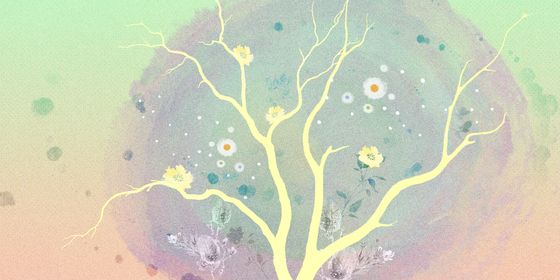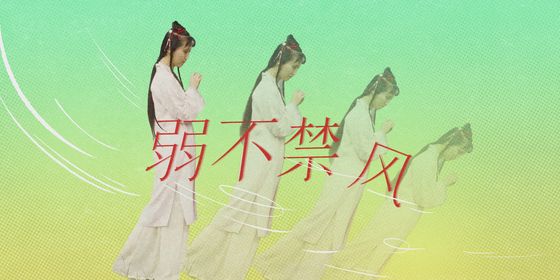Arboreal idioms for Tree-Planting Day
Since 1928, China has celebrated “Arbor Day” (植树节) on March 12 every year. Businesses typically organize trips for employees to plant seeds, and students learn about protecting the environment at school.
More recently, people can grow virtual trees and improve the world’s oxygen levels without coming close to any soil at all, through online schemes like Alibaba’s “Ant Forest,” which rewards users for reducing their carbon emissions.
Besides their ecological importance, trees have symbolic meaning in Chinese culture. For example, evergreens, like pine and cypress, are often associated with integrity and loyalty, since they don’t fade even in extreme cold. A bay tree can represent good luck, outstanding talent, and a successful career. These symbolisms have been codified in many chengyu related to trees, a few of which we’ve listed below:
玉树临风 A jade tree in the wind
The expression “jade tree (玉树)” is often used to describe a young man’s good looks. In the Tang dynasty (618 – 907), the poet Du Fu praised Cui Zongzhi in his poem “Song Of Eight Immortals Drinking”: “Zongzhi is a young handsome man…just like a jade tree standing against the wind (宗之潇洒美少年……皎如玉树临风前).” Since then, this chengyu has become one of the most common ways to compliment a charming young male with good manners.
This man is like a jade tree in the wind, that he has attracted the attention of all the women here.
Zhège nànrén yùshù línfēng, xīyǐn le zàichǎng suǒyu nǚrén de zhùyì.
这个男人玉树临风,吸引了在场所有女人的注意。
芝兰玉树 Orchids and jade trees
The book A New Account of Tales of the World, which was finished during the Northern and Southern Dynasties (386 – 589), recorded a conversation between renowned politician and scholar Xie An and his nephew Xie Xuan, a well-known official and military general during the Eastern Jin dynasty (317–420). Xie An asked a group of his children and nephews, “Why do people all hope their offspring become outstanding, since they are not necessarily going to take part in state affairs?” Xie Xuan stood up and answered, “It’s as if people just wish orchids and jade trees can be planted in their own yard.” Since Xie Xuan and many of the other descendants present had been highly successful during their lifetimes, this metaphor came to refer to children with great talent and integrity from one family.
I have heard that the children of this family are all like orchids and jade trees. Having now seen them, I can say they are worthy of that reputation.
Zǎo tīngshuō tāmen jiā de zǐdì hǎosì zhīlán yùshù, jīnrì yíjiàn, guǒrán míng bù xūchuán.
早听说他们家的子弟好似芝兰玉树,今日一见,果然名不虚传。
百年树人 It takes a hundred years to cultivate a person
But it’s not easy to cultivate jade tree-like children. Over 2,600 years ago, Guan Zhong, famous politician and strategist in the Spring and Autumn period (771 – 476BC), pointed out: “If you are planning for the next ten years, nothing is more important than cultivating trees; if you are planning for the next hundred years, nothing is more important than cultivating talents.” Later, his thought was summarized into this expression: “It takes 10 years to cultivate a tree, but 100 years to cultivate a person (十年树木,百年树人).” The phrase was often used to stress the importance of education. The original name of 20th century writer Lu Xun was Zhou Shuren (周树人), which was inspired by this chengyu.
It takes 10 years to cultivate a tree, but 100 years to cultivate a person. Education is very important for the development of our country, and we should pay more attention to cultivating talent from now on.
Shí nián shù mù, bǎi nián shù rén. Jiàoyù duì wǒmen guòjiā de fāzhǎn zhìguān zhóngyào, wǒmen còng xiànzài kāishǐ yīnggāi gèngjiā zhóngshì réncái péiyǎng.
十年树木,百年树人。教育对我们国家的发展至关重要,我们从现在开始应该更加重视人才培养。
树大根深 Big tree with deep roots
This chengyu is a metaphor for a powerful person or organization with deep-rooted influence.
This criminal organization is a big tree with deep roots; it is impossible root out all at once.
Zhège fànzuì zǔzhī shùdà gēnshēn, xiǎng yào yáícìxìng chǎnchú tāmen shì bùkěnéng de.
这个犯罪组织树大根深,想要一次性铲除他们是不可能的。
树大招风 A tall tree catches the wind
During the Three Kingdoms era (220–280), litterateur Li Kang wrote in his essay “On Fate” that “If a tree is taller than others in a forest, the wind will destroy it first (木秀于林,风必摧之).” His point was that outstanding or famous people will always be liable to being attacked. The phrase was later simplified into its current form.
A tall tree catches the wind. It’s not surprising that are jealous of him.
Shǔ dà zhāo fēng, zhōuwéi de rén jídù tā yě bù qíguài.
树大招风,周围的人嫉妒他也不奇怪。
蚍蜉撼树 Ants shaking a tree
This chengyu describes someone comically overestimating themselves. Tang dynasty (618 – 907) poet Han Yu wrote in his poem “Joking on Zhang Ji”: “Ants are trying to shake a tree, ridiculously overrating their strength (蚍蜉撼大树, 可笑不自量) !” Later this idiom was used to indicate people attempting to best someone much stronger.
If you challenge him now, it will be just like ants trying to shake a tree.
Nǐ xiànzài qù tiǎozhàn tā wúyì yú pífú hàn shù.
你现在去挑战他无异于蚍蜉撼树。
Cover image from VCG












